Learning English can totally open up new doors, whether you want to ace your career, connect with people from all over, or just enjoy more of the world around you. But let’s be real—it can feel like there are a million ways to learn, and picking the right one can be confusing.
That’s where AI comes in! The Best AI Tools for Learning English are changing the game, making language learning easier, more fun, and way more personalized. These tools use smart AI to adjust to how you learn best, give you real-time feedback, and even let you practice like you’re having a chat with a real person.
In this article, I’m sharing my top picks that’ll help you tackle English in the most effortless way possible. Let’s first see the comparison table of the AI tools that I have selected to learn the English language.
Side-by-Side Comparison of the Best AI Tools for Learning English
| Tool | Free Version | Mobile App | Best For | Unique Feature | Pricing | My Ratings |
|---|---|---|---|---|---|---|
| Duolingo | ✅ | ✅ | Beginners, Gamified Learning | Fun, game-like experience for learners | $6.99/month | ⭐⭐⭐⭐ (4.5/5) |
| Grammarly | ✅ | ✅ | Writing, Grammar, Style | Real-time writing corrections | $12/month | ⭐⭐⭐⭐⭐ (5/5) |
| Babbel | ❌ | ✅ | Real-world Conversations | Speech recognition for better pronunciation | Starting at $6.95/month | ⭐⭐⭐⭐ (4/5) |
| Rosetta Stone | ❌ | ✅ | Pronunciation & Listening | TruAccent Technology for accurate pronunciation | $11.99/month | ⭐⭐⭐⭐ (4/5) |
| HelloTalk | ✅ | ✅ | Conversational Practice | Language exchange with real native speakers | $6.99/month | ⭐⭐⭐⭐ (4/5) |
| Mondly | ✅ | ✅ | Conversational Learning | Augmented Reality lessons for immersive learning | Starting at $9.99/month | ⭐⭐⭐⭐ (4/5) |
| LingQ | ✅ | ✅ | Reading & Listening Skills | Interactive library of content | $12.99/month | ⭐⭐⭐⭐ (4.7/5) |
| AI Dungeon | ✅ | ✅ | Creative Writing Practice | AI-generated stories for immersive learning | Starting at $9.99/month | ⭐⭐⭐⭐ (4/5) |
| Memrise | ✅ | ✅ | Vocabulary, Listening Skills | Real-world video-based learning | $8.49/month | ⭐⭐⭐⭐ (4.5/5) |
| ELSA Speak | ❌ | ✅ | Pronunciation Improvement | Detailed feedback on speech patterns | $5/month | ⭐⭐⭐⭐⭐ (5/5) |
| ChatGPT | ✅ | Web Only | Conversational Practice | AI-driven real-time conversations | $20/month | ⭐⭐⭐⭐ (4.5/5) |
Let’s dive in! To See The Best AI Tools for Learning English Language
1. Duolingo
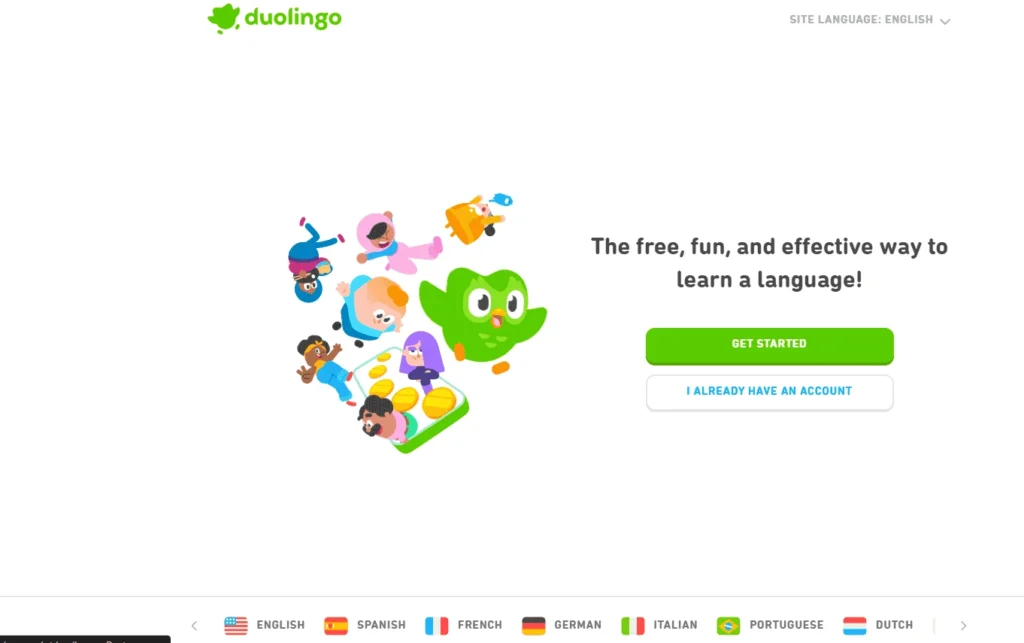
Website: Duolingo
Overview
Duolingo is a gamified language-learning app that offers interactive lessons for improving English. It uses AI to adapt lessons to the user’s learning pace and preferences.
Features
- Bite-sized lessons with real-time feedback.
- Gamified exercises, including vocabulary and grammar.
- Adaptive difficulty powered by AI.
- Community forums for peer learning.
Pros and Cons
| Pros | Cons |
|---|---|
| Free and engaging with gamified features. | Limited speaking and writing practice. |
| Progress tracking and streak rewards. | Some lessons lack depth. |
User Interface: The UI is intuitive, colorful, and user-friendly, ideal for beginners.
Mobile App
- Android: Download Here
- iOS: Download Here
2. Grammarly
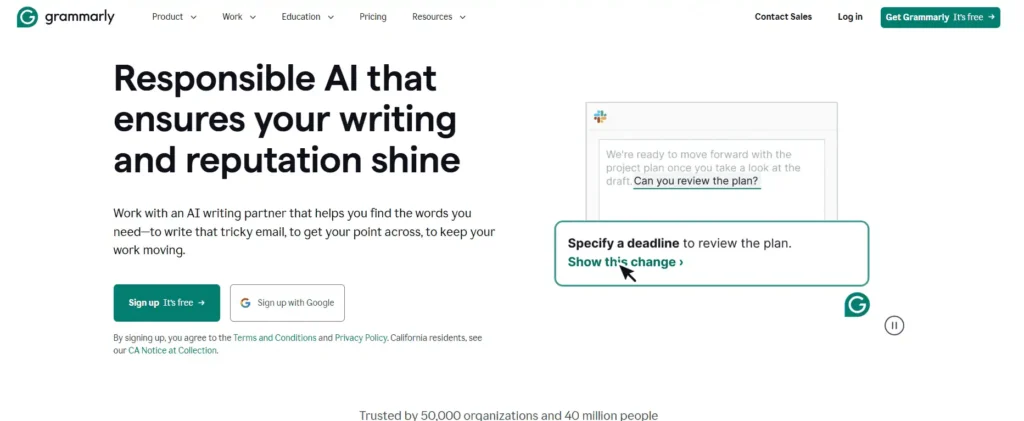
Website: Grammarly
Overview
Grammarly is an advanced AI-powered writing assistant that helps users improve grammar, spelling, punctuation, and style.
Features
- Real-time grammar, punctuation, and style suggestions.
- Vocabulary enhancement suggestions.
- Integration with web browsers, Word, and email apps.
Pros and Cons
| Pros | Cons |
|---|---|
| Excellent for grammar and style improvement. | Premium version is expensive. |
| The premium version is expensive. | Limited to writing skills. |
User Interface: Simple, professional, and highly responsive UI.
Mobile App
- Android: Download Here
- iOS: Download Here
3. Babbel
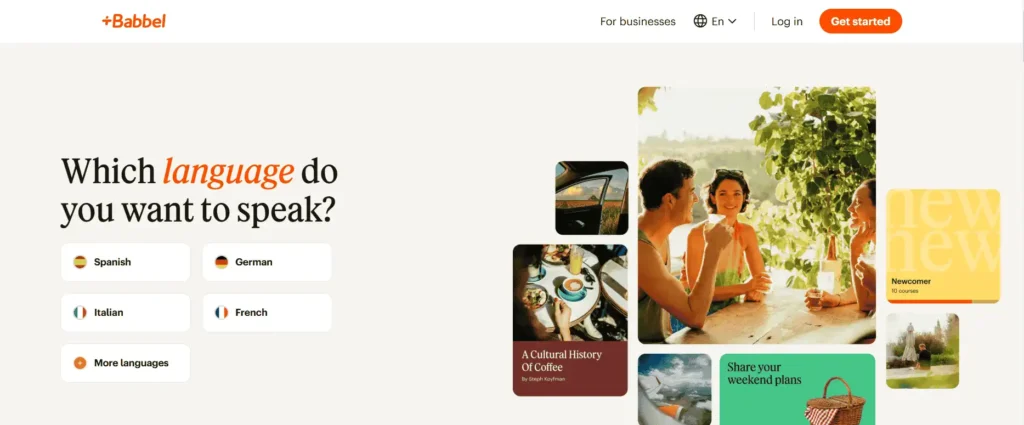
Website: Babbel
Overview
Babbel offers a structured approach to learning English with lesson plans tailored for real-world applications like travel, work, or casual conversation.
Features
- Customized lessons based on user goals.
- Voice recognition for pronunciation practice.
- Offline mode for learning on the go.
Pros and Cons
| Pros | Cons |
|---|---|
| Professional-level content. | Subscription required for full access. |
| High-quality speech recognition. | Limited free content. |
User Interface: Streamlined interface with a focus on structured learning.
Mobile App
- Android: Download Here
- iOS: Download Here
4. Rosetta Stone
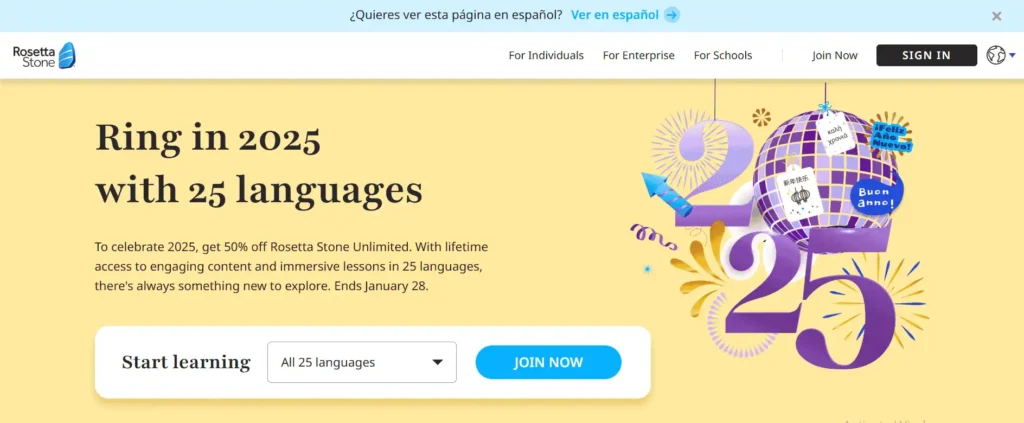
Website: Rosetta Stone
Overview
Rosetta Stone uses immersive techniques and speech recognition technology to help users master English effectively.
Features
- Immersive learning environment.
- TruAccent technology for pronunciation feedback.
- Audio-based lessons for listening practice.
Pros and Cons
| Pros | Cons |
|---|---|
| Strong focus on pronunciation. | Expensive subscription plans. |
| Immersive, no-translation method. | Can feel repetitive for some learners. |
User Interface: Clean and professional, designed for focus and immersion.
Mobile App
- Android: Download Here
- iOS: Download Here
5. HelloTalk
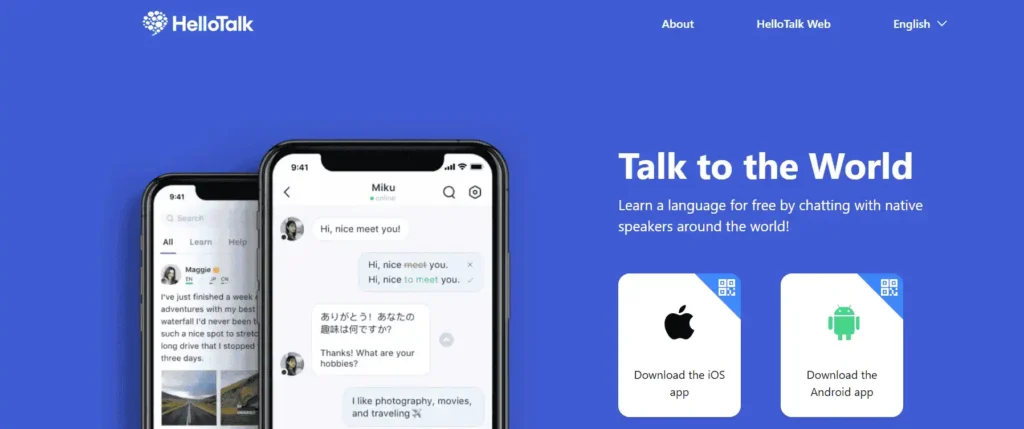
Website: HelloTalk
Overview
HelloTalk connects users with native speakers for language exchange, offering a social approach to learning English.
Features
- Chat with native speakers via text, voice, or video.
- Built-in translation and correction tools.
- Language games and challenges.
Pros and Cons
| Pros | Cons |
|---|---|
| Focus on real-world conversational skills. | Not ideal for structured learning. |
| Free to use with optional premium features. | Privacy concerns in some cases. |
User Interface: Social-media-like UI that is intuitive and engaging.
Mobile App
- Android: Download Here
- iOS: Download Here
6. Mondly

Website: Mondly
Overview
Mondly offers conversational English lessons through interactive chats, voice recognition, and augmented reality (AR). Its AI-driven approach tailors lessons to user progress.
Features
- Real-life conversations in various scenarios.
- Speech recognition for pronunciation improvement.
- Augmented Reality (AR) lessons for immersive learning.
Pros and Cons
| Pros | Cons |
|---|---|
| Engaging AR lessons. | Advanced features locked behind a paywall. |
| Focus on real-world use cases. | Limited writing practice. |
User Interface: Modern, visually appealing, and easy to navigate.
Mobile App
- Android: Download Here
- iOS: Download Here
7. LingQ

Website: LingQ
Overview
LingQ focuses on helping users improve reading and listening skills by providing a library of articles, podcasts, and audiobooks.
Features
- Interactive reading and listening tools.
- Vocabulary builder with spaced repetition.
- Syncs progress across all devices.
Pros and Cons
| Pros | Cons |
|---|---|
| Extensive library of content. | UI can feel cluttered for new users. |
| Great for self-paced learners. | Limited speaking practice. |
User Interface: Functional but slightly outdated for some users.
Mobile App
- Android: Download Here
- iOS: Download Here
8. AI Dungeon by Latitude

Website: AI Dungeon
Overview
AI Dungeon offers a unique way to practice English through interactive storytelling, allowing users to create their own adventures with AI-driven narratives.
Features
- AI-generated storytelling for immersive learning.
- Flexibility to craft personalized scenarios.
- Creative and unconventional approach.
Pros and Cons
| Pros | Cons |
|---|---|
| Fun and engaging for creativity. | Limited focus on structured learning. |
| Develops reading and creative writing. | Not suitable for grammar or vocabulary focus. |
User Interface: Minimalist and easy to use, focusing on creativity.
Mobile App
- Android: Download Here
- iOS: Download Here
9. Memrise

Website: Memrise
Overview
Memrise blends AI with real-world videos to improve vocabulary, comprehension, and listening skills.
Features
- Real-world video clips for contextual learning.
- AI-powered spaced repetition for vocabulary.
- Speech recognition for pronunciation practice.
Pros and Cons
| Pros | Cons |
|---|---|
| Contextual learning through videos. | Limited free content. |
| Effective vocabulary-building tools. | Not ideal for advanced learners. |
User Interface: Clean, vibrant, and easy to navigate.
Mobile App
- Android: Download Here
- iOS: Download Here
10. ELSA Speak
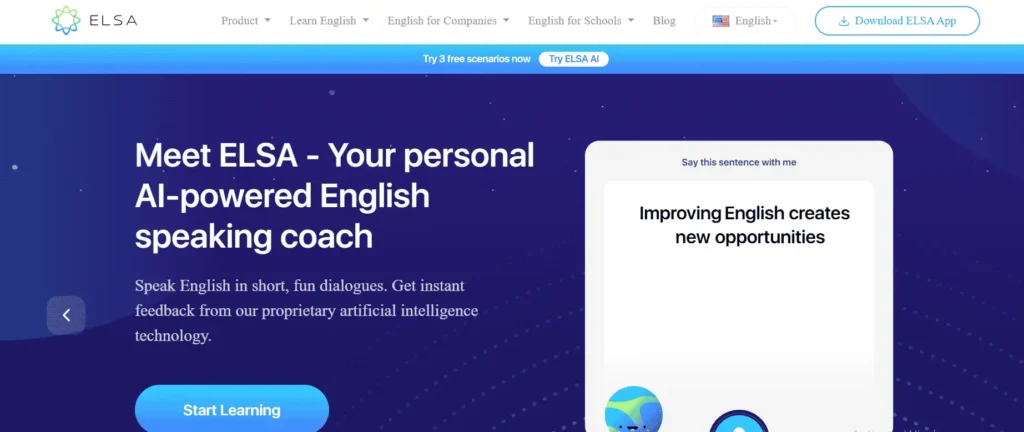
Website: ELSA Speak
Overview
ELSA Speak is a pronunciation-focused AI app that provides detailed feedback to help users sound like native English speakers.
Features
- AI-driven speech recognition for pronunciation evaluation.
- Feedback on intonation, word stress, and fluency.
- Goal-oriented lessons tailored to user needs.
Pros and Cons
| Pros | Cons |
|---|---|
| Excellent for improving pronunciation. | Limited focus on grammar and vocabulary. |
| Detailed feedback with clear suggestions. | Some features are premium-only. |
User Interface: Professional and sleek, designed for focused learning.
Mobile App
- Android: Download Here
- iOS: Download Here
11. ChatGPT by OpenAI
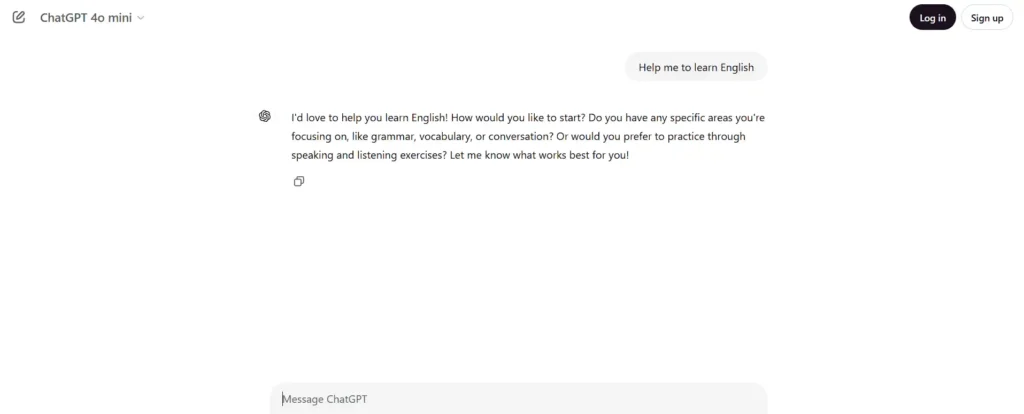
Website: ChatGPT
Overview
ChatGPT serves as an AI-powered conversational partner for practicing English in real-world scenarios, making it a great tool for both beginners and advanced learners.
Features
- Real-time conversational practice.
- Tailored responses for grammar, vocabulary, and style.
- Available as a web-based app.
Pros and Cons
| Pros | Cons |
|---|---|
| Highly versatile for various learning goals. | Requires clear input for best results. |
| Accessible and easy to use. | Lack of audio/speech-based features. |
User Interface: Minimalistic and responsive, suitable for all devices.
Mobile App
- Android: Download Here
- iOS: Download Here
Final Conclusion – Here’s What I Think

So, if we’re being real, choosing the “best” AI tool for learning English depends on what you’re aiming for. After digging deep into all the tools, here’s my honest verdict:
If you’re looking for the ultimate tool for writing and grammar, Grammarly takes the crown. It’s like having an English teacher sitting on your shoulder, correcting mistakes and improving your style in real time. Perfect for students, professionals, or anyone serious about clean, error-free writing.
For speaking and pronunciation, ELSA Speak is hands-down the winner. It’s incredibly precise in helping you master how English sounds, which is a game-changer if you want to speak confidently.
But let’s not forget Duolingo for casual, fun learning, and ChatGPT when you want to practice conversational English in a flexible and pressure-free way.
If I had to pick one combo for the best all-around experience? I’d say go with Grammarly + ELSA Speak for focused learning and mix in a little ChatGPT and Duolingo to make it more fun and interactive. Trust me, this approach will help you improve faster than you expect. Give it a try—you’ve got this! 😊
Read More: 10 Best AI Headshot Generators of 2025: Honest Reviews and Expert Picks
Frequently Asked Questions
1. What’s the easiest AI tool to get started with for English learning?
Duolingo is super beginner-friendly, with short, interactive lessons and a fun, game-like vibe.
2. Can these tools help me sound like a native English speaker?
Tools like ELSA Speak can definitely help with pronunciation, while HelloTalk connects you with native speakers to practice real conversations.
3. Can these tools help with conversational English?
Yes, tools like HelloTalk and ChatGPT excel in conversational practice by simulating real-life interactions or connecting with native speakers.
4. Which tool is best for improving English pronunciation?
ELSA Speak is the best tool for pronunciation as it uses AI to analyze speech and provide detailed feedback on intonation, word stress, and fluency.
5. Are these tools suitable for children or young learners?
Yes, tools like Duolingo and Mondly are suitable for children, offering engaging and gamified learning experiences that are fun and easy to follow.
6. Do these tools work offline?
Some tools, like Babbel and Mondly, offer offline learning features, while others, like ChatGPT, require an internet connection to function.
7. Can these tools prepare me for exams like TOEFL or IELTS?
Yes, tools like ELSA Speak and Babbel can help prepare for speaking and listening sections, while Grammarly is excellent for the writing components.
8. What’s the best tool for improving my vocabulary?
Memrise stands out for vocabulary building because it uses real-world videos and spaced repetition to help words stick.
9. How do these tools handle user privacy?
Most reputable tools prioritize user data privacy and comply with GDPR and similar regulations. Always review their privacy policies before signing up.
10. Are there any tools to practice English with real people?
Yes, HelloTalk is perfect for connecting with native speakers and practicing real conversations in a safe, friendly space.
Disclaimer: The information provided in this article is for general informational purposes only. While every effort has been made to ensure accuracy, the author is not responsible for any errors, omissions, or losses arising from the use of this information. Readers are encouraged to verify details independently before making decisions based on this content.






